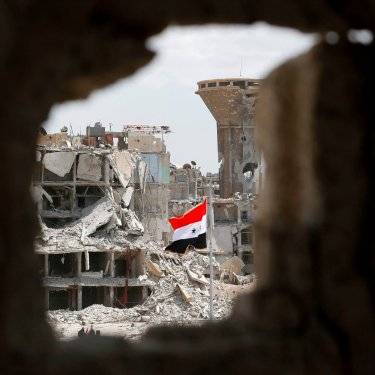The Syrian Civil War: Fall of Dictatorship?
The Syrian civil war has been ongoing for over a decade, with devastating consequences for the country and its people. The conflict began in 2011 as part of the Arab Spring protests, with Syrians demanding democratic reforms and an end to President Bashar al-Assad's authoritarian rule.
As the protests escalated, the government responded with brutal force, leading to the formation of rebel groups and the eventual descent into civil war. The conflict has drawn in various international actors, including Russia, Iran, Turkey, and the United States, each with their own interests and agendas.
The humanitarian situation in Syria is catastrophic. Over 470,000 people have been killed, and millions more have been displaced, either within Syria or as refugees in neighboring countries. The economy is in shambles, with widespread poverty, unemployment, and destruction of infrastructure, on top of that are the casualties from deaths.
The situation is particularly dire for children, with over 7.5 million in need of humanitarian assistance . Many have been forced to flee their homes, leaving behind their schools, friends, and families. Those who remain in Syria face significant risks, including recruitment into armed groups, exploitation, and abuse.
Despite the challenges, there are efforts underway to provide humanitarian assistance and support to those affected by the conflict. The United Nations High Commissioner for Refugees (UNHCR) is working to provide aid to refugees and internally displaced persons (IDPs), including shelter, food, and healthcare.
In addition, organizations like UNICEF are working to provide critical services, including education, healthcare, and protection, to children and families affected by the conflict. These efforts are crucial in helping to mitigate the impact of the conflict and provide a sense of hope and normalcy for those affected.
However, the situation in Syria remains highly volatile, with ongoing fighting and tensions between different factions. A lasting resolution to the conflict will require a comprehensive and inclusive peace process, one that addresses the underlying grievances and concerns of all parties involved.
In the meantime, it is essential that the international community continues to provide humanitarian support and assistance to those affected by the conflict. This includes not only providing aid but also advocating for a peaceful resolution to the conflict and holding those responsible for human rights abuses accountable.
The Syrian civil war is a complex and multifaceted conflict, with far-reaching consequences for the country, the region, and the world. It is a stark reminder of the devastating impact of war and conflict on civilians, particularly children, and the importance of working towards a more peaceful and just world.
Key Statistics:
- 470,000-610,000: Estimated number of violent deaths in the Syrian civil war
- 7.5 million: Number of children in need of humanitarian assistance in Syria
- 16.7 million: Number of people in need of humanitarian assistance and protection in Syria
- 6.2 million: Number of refugees from Syria
- 7.2 million: Projected number of internally displaced persons (IDPs) in Syria in 2025




No comments yet
Be the first to share your thoughts!